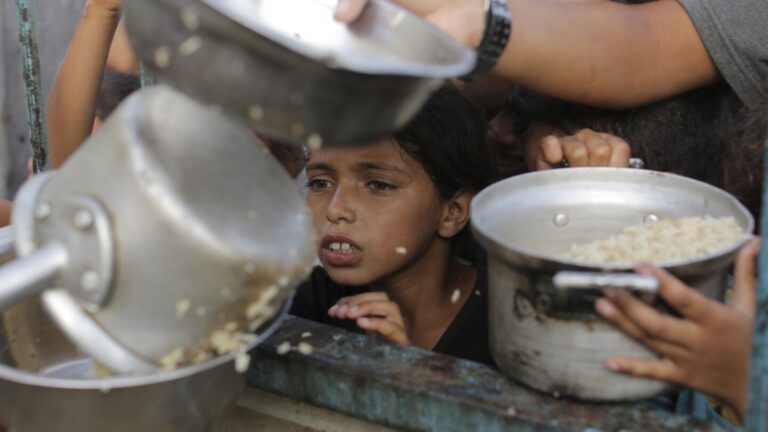JERUSALEM (AP) — The Israeli army said Sunday it was pausing daytime fighting along a route through southern Gaza to free up remaining supplies. Humanitarian Aid Providing supplies to desperate Palestinians enduring a humanitarian crisis caused by a war now in its ninth month.
The “tactical ceasefire,” which applies to about 12 kilometers (7.4 miles) of road in the Rafah area, falls far short of a complete ceasefire in the area, as the international community has called for. Including Israel’s biggest ally, the United States.This could help address some of the overwhelming needs of Palestinians, which have surged in recent weeks following the Israeli invasion of Rafah.
The army said the daily ceasefire would begin at 8 a.m. (5 a.m. GMT) and last until 7 p.m. (7 p.m. GMT) and would continue until further notice. After extremist factions in Prime Minister Benjamin Netanyahu’s government opposed the halt to the fighting and criticized the move, the army said fighting had not stopped in the rest of southern Gaza and that there would be no changes to the general flow of aid.
The army said the suspension was to allow aid trucks to reach the nearby Israeli-controlled Kerem Shalom checkpoint, the main entry point for aid, and travel safely to the Salah al-Din highway, the main north-south road. bottleneck Since Israeli ground forces entered Rafah in early May.
The Israeli military’s COGAT, which oversees aid distribution in the Gaza Strip, said the route would increase the flow of aid to other parts of the Gaza Strip, including Khan Yunis, the coastal area of Mwasi and the central Gaza Strip. Supplies are being brought in through a northern checkpoint to reach the hardest-hit areas in the north of the Strip, which was targeted early in the war.
The military said the hiatus was Muslims celebrate major holiday of Eid al-AdhaThis decision was made following consultation with the United Nations and international aid agencies.
UN humanitarian spokesman Jens Rahlke told The Associated Press that the Israeli announcement was welcome but that “no aid has been sent from Kerem Shalom today,” without providing further details. Rahlke said the UN looked forward to further concrete steps from Israel, such as ensuring smooth running of checkpoints and regular deliveries of needed fuel.
Israel and Hamas Considering latest ceasefire proposalIt’s a plan detailed by President Joe Biden in his administration’s most intensive diplomatic effort to seek a halt to the fighting and the release of hostages held by militant groups. Biden said the proposal was Israel’s, but Israel has not fully accepted it. Hamas is demanding changes that Israel considers unacceptable.
Fighting continues. Israel on Sunday released the names of 11 soldiers killed in recent attacks in Gaza, bringing the number of soldiers killed since Israel began its ground invasion of Gaza last year to 308. Israeli officials said Hamas killed 1,200 people and took 250 hostages in the October 7 attack. Health officials in Hamas-ruled Gaza say more than 37,000 Palestinians have been killed.
Israel’s military offensive against Hamas has plunged Gaza into a humanitarian crisis, with the United Nations reporting that hundreds of thousands of people are on the brink of starvation.
Hamas Supreme Leader Ismail Haniyeh on Sunday called for increased pressure to open the border crossing. The other crossing between Gaza and Egypt, Rafah, has been closed since Israel invaded the city. Egypt refuses to reopen it as long as Israel controls the Palestinian side of Gaza.
The flow of aid to southern Gaza is declining as the needs grow. More than one million Palestinians, many of whom are already displaced, are stranded there. Fleeing Rafah after the invasionThey are now pouring into other parts of southern and central Gaza, where most live in tent camps and where sewage is flooding the streets.
Between May 6 and June 6, the UN received an average of 68 truckloads of aid per day, down from 168 truckloads per day in April and far below the 500 truckloads per day aid groups need.
COGAT says there are no restrictions on trucks entering Gaza. Between May 2 and June 13, more than 8,600 trucks of all kinds, including aid and commercial goods, entered Gaza through all checkpoints, an average of 201 per day. But much of the aid is piled up at checkpoints.
COGAT spokesman Shimon Friedman said the UN was to blame for its cargo piling up in the Gaza Strip in Kerem Shalom. He said the UN agency “has fundamental logistical problems that it has not been able to solve,” specifically pointing to a shortage of trucks.
The UN denies the allegations. It says fighting in Gaza makes it too dangerous for UN trucks to reach Kerem Shalom, and that the Israeli army has to give drivers permission to get to the site, slowing the pace of deliveries. Israel says the system is designed for the safety of drivers.
The new arrangement aims to reduce the need for delivery coordination by providing an 11-hour uninterrupted time slot each day.
Due to a lack of security, some aid trucks have been looted by crowds while traveling on Gaza roads, and it was not immediately clear whether the army would provide security to protect aid trucks on the highways.
___
Shurafa reported from Deir al-Balah in the Gaza Strip. Keith reported from Cairo. Associated Press writer Jack Jeffrey in Jerusalem contributed to this report.
___
See AP’s Gaza war coverage below: https://apnews.com/hub/israel-hamas-war

